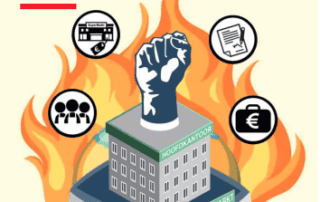Stone in the pond in forecasting issues
As of July 1, 2016, an important amendment to the law came into force. This concerns the Acquisition Fraud Act (Section 6:194 of the Dutch Civil Code, paragraphs 2 to 4), which is primarily intended to prevent misrepresentations in recruitment activities. The law should also curb misleading advertising. However, the law also has a direct relationship with franchise relations.
Minister Kamp of Economic Affairs has made a first move to this end and has informed the House of Representatives how the law should be interpreted in franchise relationships. In short, the minister is of the opinion that forecasting problems in franchise relationships also fall within the scope of the new law. The Minister has stated in so many words that the law applies to franchise relationships in his view.
Acquisition fraud
Acquisition fraud within the meaning of the law applies to:
misleading statements; where material information is omitted, concealed, or presented in an obscure manner; where that information is necessary to make an informed transactional decision.
If acquisition fraud is involved, the new law will result in a reversal of the burden of proof. Acquisition fraud is a form of tort and results in liability for damages. In addition, acquisition fraud has been made a punishable offence.
It follows from Minister Kamp’s announcements to the House of Representatives that the franchisee can derive protection from the new law against the franchisor. In particular, this concerns the provision of unsatisfactory forecasts prior to the conclusion of a franchise agreement by the franchisor. In that case, the franchisee has the benefit of the burden of proof reversal. A franchisee can also file a targeted criminal report.
Until now, the franchisee had to use the legal instruments of error and fraud in this context. These are sometimes difficult to prove. The franchisee must then generally demonstrate that there is intent or knowledge on the part of the franchisor regarding the inadequacy of the prognosis. In addition, fraud and error may void the franchise agreement, with all performance reversed. Compensation is not always obvious. As regular visitors to this site know, this problem is the subject of many legal proceedings.
Under the new law, the franchisee in principle only needs to state motivated acquisition fraud, after which the franchisor must convincingly demonstrate that the prognosis was sound. The franchisee therefore does not have to prove that the prognosis was wrong, but the burden of proof is reversed: the franchisor must demonstrate that he has done his homework properly. If the franchisor fails to do so, this constitutes an unlawful act, which also implies an obligation to pay compensation for damage.
All in all, the new law has quite a few consequences. It is true that the law entered into force on 1 July 2016 and therefore applies to forecasts issued from that moment onwards. Would however, a franchisee must at any time make a reinvestment in its establishment, and receive a new forecast from its franchisor as part of this, then the law does in principle apply to this. This includes opening a new branch or other business where essential information is provided to the franchisee by its franchisor necessary to make an informed decision on a major transaction. The franchisee’s legal position, particularly in connection with prognostic problems, is therefore considerably strengthened. A revolution in franchise relations!
mr. DL van Dam – Franchise lawyer
Ludwig & Van Dam Franchise attorneys, franchise legal advice.
Do you want to respond? Go to vandam@ludwigvandam.nl

Other messages
Hard or soft? That makes a difference!
Hard or soft? That makes a difference! In practice, ...
Post non-competition ban without a signed franchise agreement
Is a franchisee bound by a post-competition ban without ...
Post non-competition ban without a signed franchise agreement
Is a franchisee bound by a post-competition ban without a ...
Post non-compete clause in hard franchising
The summary proceedings judge of the Amsterdam District Court ...
Does an agreed rent indexation always apply?
Many entrepreneurs were confronted with a significant rent increase ...
Ludwig & Van Dam in Distrifood Magazine about the Franchise Act
Interview about the current obstacles for independent supermarket entrepreneurs and ...






